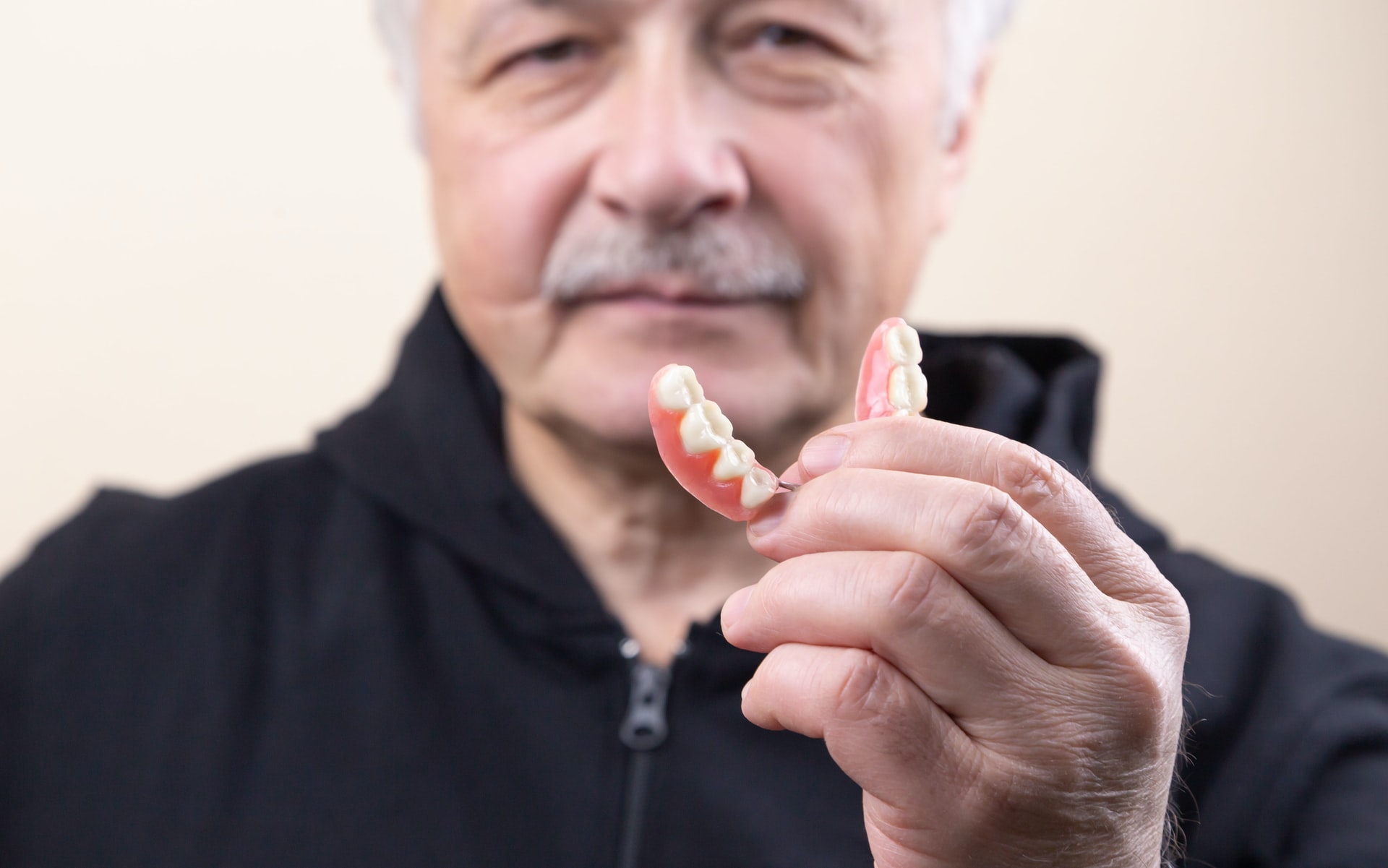Dentures are removable replacement options for missing teeth. They also support the surrounding tissues. Millions of Americans rely on them to replace their missing teeth and restore structure and function.
Types of Dentures
Dentures are mainly of two types –
Complete
They are used in cases where all the teeth are missing in a patient. These are further divided into “conventional” and “immediate” types. A conventional denture is placed in the patient’s mouth after 8-12 weeks of teeth removal. In this time frame, the gum tissue starts to heal and the conventional one is made.
Immediate
On the other hand, immediate dentures are made well in advance and are placed in the patient’s mouth as soon as teeth are removed. Owing to their immediate nature, the patient doesn’t have to be without teeth during the healing period. However, since bones and gums shrink over time, immediate dentures require more adjustments to fit properly. It is for this reason that they are considered a temporary solution until conventional ones are delivered.
Partial dentures are used in cases where there are some natural teeth present in the patient’s mouth. These consist of replacement teeth attached to a plastic base that is either pink or gum-colored. This can sometimes be connected by a metal framework that holds the denture in place. Partial dentures not only fill in the spaces left by the missing teeth but also prevent the adjacent or opposing teeth from changing positions. Precision partial dentures are usually removable and have internal attachments instead of clasps that attach to adjacent crowns, giving it a more natural-looking appearance.
Making of Dentures

The development of dentures occurs over a series of appointments spanning a few weeks. Your dentist will determine what type of appliance will work best for you and proceed with the following –
- Creating a series of impressions of the jaw.
- Taking measurements of how the upper and lower jaws relate to one another and the space between them.
- Creating models, wax, and/or plastic forms and patterns in the shape and position of the dentures. The trials will happen with these models multiple times and will be assessed for shape, color, and fit before the final denture is cured.
- Casting the final denture.
- Making any necessary adjustments.
It must be noted that new dentures might feel a little loose or odd for a couple of weeks until the tongue and cheek muscles adjust to keeping them in place. It might also take you a couple of tries to get comfortable in inserting and removing them. And while you might experience minor irritation and soreness in the beginning, these problems gradually subside as the mouth adjusts to them.
Pros Of Dentures
- The procedure of getting dentures is much faster than all the other teeth replacement options. While implants are a fantastic option, the entire process from start to finish may take multiple months. Dentures, on the other hand, can be created, completed, and delivered within two to six weeks. Certain dentists also offer rush services in which you can get them delivered within 24 to 48 hours.
- Dentures appear and feel like your real teeth. Once you’ve adjusted to wearing the dentures, people won’t be able to tell if you’re wearing them. Additionally, they restore the function of your teeth.
- Dentures also offer support to the jaw bone and soft tissues of the oral cavity. Since the muscles in your jaw and mouth weaken as you age, you start to develop a very sunken appearance. The additional support that dentures provide to these muscles gives you a very defined and natural appearance.
- Dentures are pretty affordable and have very few restrictions in the treatment process. This makes them a fantastic option for people of all ages.
- The restored aesthetic serves as an instant boost in self-esteem.
- No surgical procedure is involved in the treatment process.
Cons Of Dentures
- Although dentures are a great option for replacing missing teeth, a certain adjustment period follows the denture delivery. You might encounter issues when you start to wear your dentures. It takes a while to get used to wearing them and subsequently eating and speaking with them.
- They aren’t a permanent solution and might require replacing every 5 to 8 years. This is because our facial structures change with age and the older dentures might no longer fit properly.
- Similar to a replacement, they have to be constantly readjusted to fit properly. Their ill-fitting can cause stomatitis, which is an inflammation of the lips and mouth caused by irritation.
- They reduce your ability to taste food since they cover the hard palate which plays a role in smell and taste.
- Dentures that aren’t cleaned and maintained properly might lead to yeast infections, bad taste in the mouth, and halitosis (bad breath).
- On certain occasions, they can trigger allergic reactions in some patients.
- If patients find it difficult to adjust to dentures, they might develop a constant gag. This usually happens when they extend to sensitive areas such as the backsides of your throat and tongue or into the soft tissue on the upper palate. In these instances, patients can’t wear them constantly.
Caring For Dentures

- Both partial and complete dentures that are removable must be removed from the mouth and rinsed with warm water after every meal. This will cleanse them of any food particles that might be stuck, preventing infections.
- Before sleeping, they must be removed and soaked overnight in a denture-soaking solution or water. This prevents the drying out of the denture and losing its shape. Furthermore, their removal overnight also allows the oral tissues to heal from any irritation that might have occurred.
- Similar to your natural teeth, dentures also need to be brushed daily. However, they should be cleaned with a denture-specific non-abrasive cleanser instead of toothpaste. Remember to use a soft-bristled toothbrush and clean all surfaces, paying close attention to the grooves that fit into the gums.
- Patients must note that even though they might not have any natural teeth present, they still need to clean their tongue, cheeks, gums, and the roof of the mouth using a clean gauze or a soft toothbrush to maintain their oral health.
Call River’s Bend Family Dental Clinic today to schedule an appointment. Our expert team of dentists will guide you in taking better care of not only your dentures but also your oral health.




